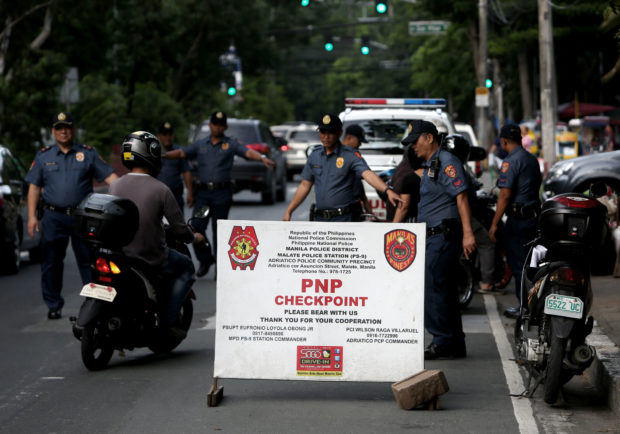AFP, PNP to public: Trust us, don’t panic over bombings

HEIGHTENED ALERT IN METRO MANILA / AUGUST 02, 2018
Policemen from Police Station 9 man the check point along Quirino Avenue, Manila. The Metro Manila were placed on a heightened state of alert following the Basilan bombing that left 11 people dead. INQUIRER PHOTO / RICHARD A. REYES
Following consecutive bombings over the past week in Basilan, Rizal, and Masbate provinces, prompting the police to declare a heightened security alert in Metro Manila and the Autonomous Region in Muslim Mindanao, the Philippine National Police (PNP) and the Armed Forces of the Philippines (AFP) are now trying to allay the wave of fear spreading among the public.
In a statement on Friday, PNP spokesperson Senior Supt. Benigno Durana cautioned against a circulating text and online message warning that the Basilan bombing, for which international terror group ISIS took credit for, was just a “prelude” to bigger bombings in urban centers in the country.
“There is no specific threat on any particular target. Therefore, the text scare being spread around is untrue and is obviously designed only to create panic,” said Durana. “Scare messages of this nature deserve to be discarded and not shared.”
Durana assured that a preventive plan has been laid out to secure possible targets and to thwart any attempt by any group to infiltrate communities.
The national police spokesperson urged the public to remain vigilant, part of which was to report peddlers of scare messages to the police.
Article continues after this advertisementMeanwhile, AFP spokesperson Col. Edgard Arvelo urged the public to “trust their security forces,” likewise urging the public not to panic, but also not to be complacent.
Article continues after this advertisementThe military spokesperson, in a radio interview, said the probability that “harm could be done by these terrorists” is “not that big, and we can further reduce the probability” by “using all resources in order to crush and defeat them.”
Arevalo also appealed to the public “not to immediately jump to conclusions,” maintaining that despite the ISIS claim, there is actually no solid indication that the Basilan bombing was committed by a foreign ISIS suicide bomber.
The bomb—an improvised explosive—had gone off inside a van passing through a Citizen Armed Forces Group Unit (Cafgu) checkpoint on the way to Lamitan City last July 31. Six Cafgu members died in the incident, along with four civilians including the wife and the 10-year-old child of one of the Cafgu members. The unidentified driver had also been killed.
The military and police earlier said the bombing was likely perpetrated by the Basilan-based faction of the Abu Sayyaf Group led by Furiji Indama as part of extortion attempts on local government units, and that the van’s driver was just a courier for improvised explosives supposed to be spread throughout Lamitan City.
A person of interest, who military tagged as having participation in the incident, had been arrested later in the day, allegedly having a grenade in his possession when he was picked up by policemen.
Arevalo also maintained that the Basilan bombing had no connection to an abandoned explosive that went off in the same day in Antipolo, Rizal, and another explosion at a Masbate port on Wednesday night, both of which the military spokesperson said was likely attacks by communist rebels. /jpv
RELATED STORY